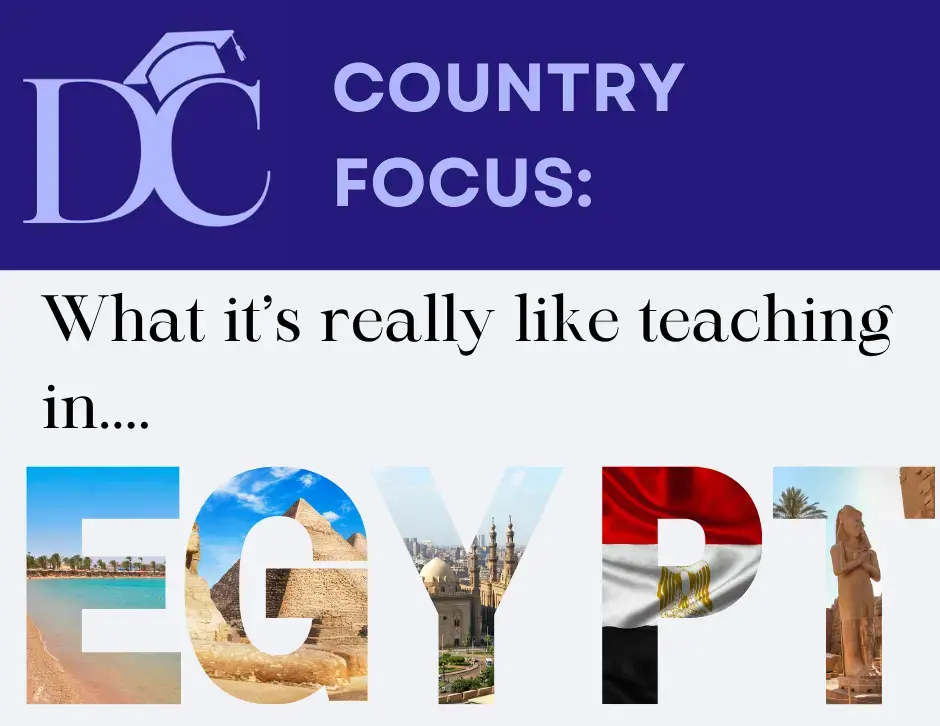Teaching English in Egypt: What to Expect
- Connor O'Donoghue

- Jul 4, 2025
- 6 min read

If you’re thinking about teaching English abroad, Egypt might not be the first place that comes to mind, but it’s a destination that regularly attracts adventurous teachers looking for a mix of culture, challenge, and opportunity. While it’s important to go in with your eyes open, Egypt can offer an unforgettable experience, both professionally and personally.
Why Teach English in Egypt?
Egypt is a country of striking contrasts. Ancient monuments sit alongside modern shopping centres. The chaotic streets of Cairo give way to quiet neighbourhood cafés. It’s a place where you can explore millennia of history, snorkel in the Red Sea, spend weekends in cities like Luxor or Aswan, and learn Arabic from your local fruit seller. The call to prayer echoes over bustling streets, and you’ll find both deep-rooted tradition and fast-paced change. For many foreign teachers, these varied experiences and sights are part of the appeal.
There’s also the chance to live in a Muslim-majority country, something that appeals to many British Muslim CELTA graduates in particular, whether because of faith, culture, language, or a desire to contribute to education in the Arabic-speaking world.
If you're not sure about where you'd like to teach abroad, you could also check out our posts on teaching in Costa Rica or Turkey.

What Kinds of English Teaching Jobs Are Available in Egypt?
Most English teaching positions in Egypt fall into one of the following categories:
Private language centres: These schools often run classes in the afternoons and evenings, catering to children, teens, or adults. They usually provide the bulk of opportunities for teachers with a CELTA and no prior experience.
Private schools offering a national or bilingual curriculum: Some of these hire foreign English teachers for younger learners, and while they may prefer candidates with a teaching degree, CELTA-qualified teachers are sometimes accepted.
Online teaching and tutoring: Many teachers supplement their income with freelance online lessons or in-person tutoring, especially exam prep or conversational English.
Advertisements for these positions often appear informally, on Facebook groups or by word of mouth, and it’s common to apply while already in the country. Some roles are advertised internationally on websites like www.tefl.com, especially those in more formal institutions.
TEFL Salaries and Cost of Living in Egypt
Current Salary Ranges (Updated for 2025)
Private language schools typically pay between 6,000–12,000 EGP/month (around £110–£220).
Public school jobs for foreigners are rare and tend to offer around 4,000–8,000 EGP/month (£75–£150).
Private tutoring is a common side gig, with rates of 150–300 EGP/hour (around £2.80–£5.50).
Full-time CELTA-qualified teachers working at private language centres can expect 6,000–12,000 EGP/month, with some managing to stretch to 15,000–18,000 EGP/month (~£275–£330) through tutoring or part-time online teaching.
How Far Does That Go?
Rent: A one-bedroom apartment in a central area like Maadi might cost between 4,000–10,000 EGP/month (£65–£165).
Utilities: Around 800–900 EGP/month (£13–£15) for electricity, water, and gas.
Groceries and basics are cheap by UK standards. You can buy fresh fruit, bread, and vegetables for pennies, and meals out can cost less than £2.
Transport: Metro rides cost about 10 EGP (£0.17), and apps like Uber are widely used.
Teachers earning 10,000 EGP can generally live modestly but comfortably, especially if rent is shared. Those earning on the higher end may be able to travel, save a little, or live a more comfortable life.
Visas and Work Permits for English Teachers in Egypt
The reality is that some schools in Egypt do not provide visa sponsorship, especially for short-term contracts. It’s possible to enter the country on a tourist visa and then switch to a residency permit, but this can be a grey area legally. Teachers have reported working on tourist visas while waiting for their employer to process paperwork, or, in some cases, with no sponsorship at all.
It’s not a Wild West situation, but it does require caution. Always ask your prospective employer about visa support and make sure you understand what they will (and won’t) provide. There are legitimate paths to work permits, but not all employers take them.
Accommodation and Daily Life in Egypt
Some schools provide housing or a housing allowance, though it’s far from universal. When accommodation is provided, it may be shared, often with other foreign teachers. Photos may not match the reality, so it’s wise to ask for up-to-date images and to read contracts carefully.
If you’re arranging your own flat, districts like Maadi, Zamalek, or New Cairo are popular with foreigners. Prices vary widely depending on location, amenities, and whether bills are included.

Daily Life, Safety, and Social Realities in Egypt
Most teachers say they feel safe in Egypt, particularly in expat-friendly areas. That said, foreign women often report catcalling, and while many say it’s less frequent than expected, some have had negative experiences. One teacher noted being grabbed by a motorcyclist; others say they’ve been shouted at or stared at, especially in less central areas.
Many foreign women choose to dress modestly (e.g. covering arms and legs) in daily life, and reserve bikinis or Western clothes for beach resorts like Dahab or Sharm El Sheikh. It’s also common for women, both foreign and local, to take private transport (like Uber) rather than public buses.
One Canadian teacher recalled being warned about safety before arriving, but ultimately never felt unsafe. The key was to avoid dark alleys, walk confidently, and know when to head home.
Political and Security Context
Egypt is currently under a long-standing state of emergency, and public criticism of the government is not tolerated. Foreigners are rarely targeted, but public demonstrations are banned, and casual remarks about politics, especially online, can have serious consequences. It’s best to avoid political conversations altogether and remain neutral in public forums.
Travel to certain areas (like North Sinai or the Western Desert) is strongly discouraged due to military activity. Stick to well-travelled routes, and follow your embassy’s travel advisories. Cairo and major cities are generally safe, but you should exercise the usual urban precautions.
Language Barriers and Daily Communication
English is widely spoken in tourist areas, but less so in local markets, taxis, or when dealing with bureaucracy. Learning some Egyptian Arabic goes a long way, especially for women. Basic phrases like “stop here” or “how much?” can make daily life much smoother.
It’s worth downloading Google Translate and carrying a bit of cash because many places don’t take cards. Being flexible and patient is essential.
Classroom Conditions and Teaching Culture in Egypt
Teaching styles and expectations can vary. Some schools are well-resourced, with supportive colleagues and helpful admin staff. Others are disorganised or inconsistent. Reports suggest that some contracts change after arrival, so it’s essential to get everything in writing and clarify duties before signing.
You may find yourself teaching classes of 10 or 30, following a set curriculum or creating your own lessons. Adaptability is key, and experienced teachers often say it takes a few weeks to get the hang of the local rhythm.
Still, many teachers say they’ve built strong relationships with their students and Egyptian colleagues. Schools may host trips, social events, or professional development workshops.
Travel Opportunities and Expat Lifestyle in Egypt
Egypt is incredibly well-located for travel. You can take weekend trips to Alexandria, Luxor, or the Red Sea. Budget airlines fly to Europe and the Gulf. Diving, hiking, and cultural tourism are all accessible.
One teacher mentioned getting their scuba diving certification in Dahab, while others regularly travelled with coworkers or joined organised trips. Cairo can feel chaotic, but there are plenty of escapes.
While Egypt is a conservative country, you’ll find a range of lifestyles. Some expats enjoy shisha cafés and late-night outings; others join mosques or religious study groups. Alcohol is available (though not widespread), and many teachers order groceries or food online, often for the equivalent of £1–£2 a meal.
Is Egypt the Right First TEFL Job for You?
If you’re looking for stability, luxury, or a clearly defined career path, Egypt may not be the right fit. But if you’re adventurous, flexible, and open to a bit of chaos, it could be an unforgettable start to your English teaching career!
For Muslim teachers in particular, Egypt offers the chance to live in a majority-Muslim country, improve Arabic, and experience daily life with a shared rhythm of prayer, holidays, and cultural values.
It’s not always easy, but it’s rarely boring!
Curious about teaching English abroad—and how the CELTA fits in?Join our free informational webinar for future teachers. We’ll walk you through what CELTA is, where it can take you, and how to choose the right course.
Dr Connor O'Donoghue hails from Ireland and he started teaching English as a foreign language in Poland in 2003 and he became a CELTA trainer in 2008. He has taught and trained in Ireland, the UK, France, Italy, Slovenia, Macedonia, Poland, Russia, Kazakhstan and Vietnam. Connor also holds a Masters and a PhD in Education from Trinity College in Dublin. He has previously managed large teacher training centres in Vietnam and in London before founding DC Teacher Training.




Comments